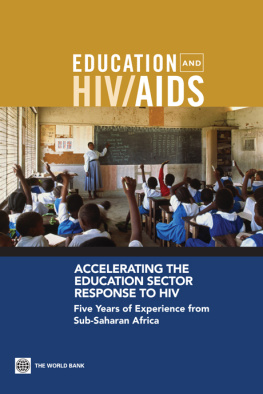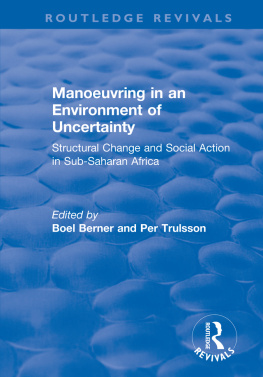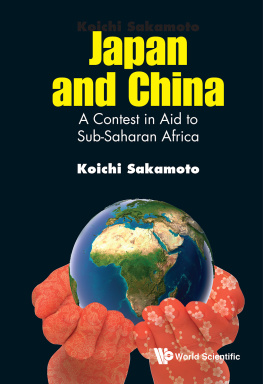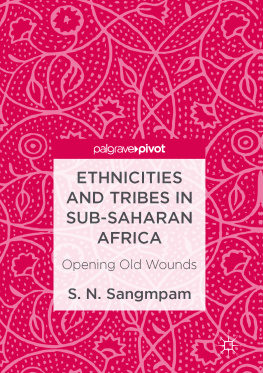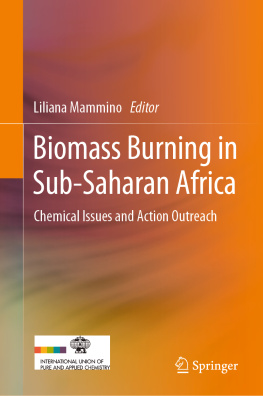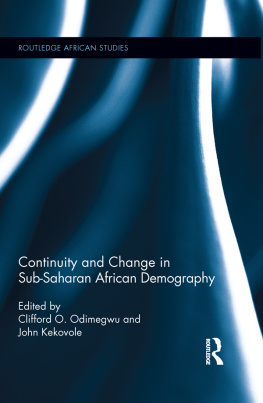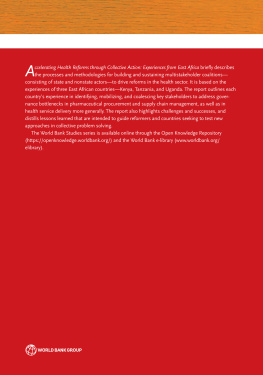Accelerating the Education Sector Response to HIV
Accelerating the Education Sector Response to HIV
Five Years of Experience from Sub-Saharan Africa
Donald Bundy
Anthi Patrikios
Changu Mannathoko
Andy Tembon
Stella Manda
Bachir Sarr
Lesley Drake

2010 The International Bank for Reconstruction and Development / The World Bank
1818 H Street NW
Washington DC 20433
Telephone: 202-473-1000
Internet: www.worldbank.org
E-mail:
All rights reserved
1 2 3 4 13 12 11 10
This volume is a product of the staff of the International Bank for Reconstruction and Development / The World Bank. The findings, interpretations, and conclusions expressed in this volume do not necessarily reflect the views of the Executive Directors of The World Bank or the governments they represent.
The World Bank does not guarantee the accuracy of the data included in this work. The boundaries, colors, denominations, and other information shown on any map in this work do not imply any judgement on the part of The World Bank concerning the legal status of any territory or the endorsement or acceptance of such boundaries.
Rights and Permissions
The material in this publication is copyrighted. Copying and/or transmitting portions or all of this work without permission may be a violation of applicable law. The International Bank for Reconstruction and Development / The World Bank encourages dissemination of its work and will normally grant permission to reproduce portions of the work promptly.
For permission to photocopy or reprint any part of this work, please send a request with complete information to the Copyright Clearance Center Inc., 222 Rosewood Drive, Danvers, MA 01923, USA; telephone: 978-750-8400; fax: 978-750-4470; Internet: www.copyright.com.
All other queries on rights and licenses, including subsidiary rights, should be addressed to the Office of the Publisher, The World Bank, 1818 H Street NW, Washington, DC 20433, USA; fax: 202-522-2422; e-mail: .
ISBN: 978-0-8213-7932-5
eISBN: 978-0-8213-7978-3
DOI: 10.1596/978-0-8213-7932-5
Cover photo: Getty Images/Paul Kenward
Library of Congress Cataloging-in-Publication Data
Accelerating the education sector response to HIV: five years of experience from Sub-Saharan Africa.
p. ; cm.
The report was written by: Donald Bundy ... [et al.].Acknowledgments.
Includes bibliographical references and index.
ISBN 978-0-8213-7932-5 (alk. paper)
1. AIDS (Disease)PreventionAfrica, Sub-Saharan. 2. Health educationAfrica, Sub-Saharan. I. Bundy, Donald A. P. II. World Bank.
[DNLM: 1. HIV Infectionsprevention & controlAfrica South of the Sahara. 2. Government ProgramsAfrica South of the Sahara. 3. Health Educationorganization & administrationAfrica South of the Sahara. 4. Health Promotionorganization & administrationAfrica South of the Sahara. 5. International CooperationAfrica South of the Sahara. WC 503.6 A169 2009]
RA643.86.A357A33 2009
362.196979200967dc22
2009015198
Preface
The work described in this review shows the commitment of education teams throughout Africa to contribute to the multisectoral response to HIV/AIDS. It is also a testament to the leadership shown by Ministries of Education, in helping the new generation of children and youth grow up better able to challenge HIV, and in providing care and support for the educators who often represent more than half the public sector workforce.
Across the continent, HIV/AIDS has the ability to affect not only the supply of education, by its impact on teachers and education staff, but also the demand, by impoverishing households and creating orphans, currently estimated at some 11.4 million from AIDS alone. When added to the other major issues facing the continent, such as conflicts, political instability, food and energy shortages, and environmental shocks, the epidemic is yet a further challenge to the capacity of education sectors to attain Education for All and meet the Millennium Development Goals. But this review shows that the education sectors are rising to the challenge in ways that are increasingly effective.
The work described in this review does not suggest any single solution. Instead, the approach is based on the recognition that Africa is a diverse continent, and countries need to find their own local approaches to the epidemic. The Regional Economic Communities (RECs) of the African Union have been instrumental in encouraging locally specific responses and, recognizing that HIV knows no frontiers, in coordinating responses among neighbors. The countries of East, Central, and West Africa, working through the RECs, have created subregional networks of Ministry of Education HIV/AIDS Focal Points; these networks have been key to sharing information and developing capacity, and so to accelerating and strengthening responses at the national level.
The review shows how, over the last five years, the leadership in Ministries of Education has been crucial in mobilizing these activities, and also emphasizes that effective implementation depends on the full participation of all stakeholders. Education staff, educators, and learners all have a role to play, as do parent-teacher associations, teachers unions and the many civil society organizations, including faith-based organizations, that are so important in the nonformal sector. The review also demonstrates the commitment of the development partners, and their efforts to harmonize their contribution toward strengthening the education agenda.
As the review shows, a good start has been made, and much has been achieved. But much remains to be done if the education sectors across Africa are to realize their full potential to contribute to the national responses to HIV/AIDS. To this end, I call upon the leaders of countries in Africa, development partners, nongovernmental organizations, and all education partners and actors to further commit themselves to provide our children a better future.
Mr. Dzingai Mutumbuka (October 2008)
Chair
The Association for the Development of Education in Africa (ADEA)
Foreword
By the end of 2006, an estimated 39.5 million people worldwide were living with HIV infection. Globally, AIDS is the fourth leading cause of death. Within the next five years, and at the pace of access to antiretroviral therapy (ART), every seventh child in the worst affected Sub-Saharan countries will be an orphan, largely because of AIDS.
HIV treatment is an essential part of the response to this epidemic, but although treatment efforts gather pace, HIV prevention is too often being left behind. Data from 2005 showed that the rate of new HIV infections greatly exceeded the expansion of HIV treatment, making it clear that universal access to ART will only be achieved once HIV prevention becomes dramatically more successful. Many people still do not believe they are at risk, and stigma and discrimination still discourage many people from taking an HIV test to determine their HIV status.
HIV prevention and treatment are linked strategically by the formal international agreement at the United Nations General Assemblys June 2006 High Level Meeting on AIDS to scale up towards the goal of universal access to comprehensive HIV prevention programs, treatment, care and support by 2010. The universal access commitment emphasizes the need for far greater urgency, equity, affordability, and sustainability in national AIDS responses, as well as a comprehensive and, importantly, multisectoral approach. Universal access seeks to engage countries in defining for themselves what they want to achieve and the time frame for scaling up. In developing this theme, the African Union declared 2006 the year of accelerating access to HIV prevention, and 30 countries formally recognized the need to accelerate HIV prevention.

